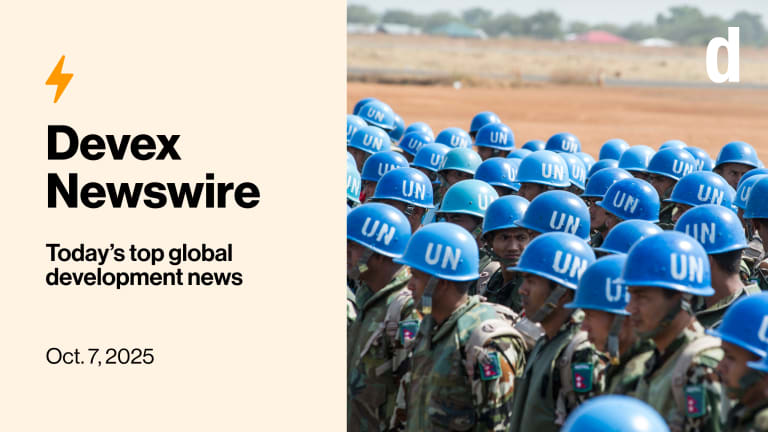
The Food and Agriculture Organization has put together a mini agrifood road map to combat hunger and climate change. But it drew loud criticisms — and it’s unclear if those will be addressed when the full report is released.
Also in today’s edition: We look at the biomolecular makeup of the world's food supply and wrap up another World Health Assembly.
Falling FAO-L of climate
Designing a plan to end world hunger while keeping global warming below 1.5 degrees Celsius was always going to be a monumental challenge.
This is a preview of Newswire
Sign up to this newsletter for an inside look at the biggest stories in global development, in your inbox daily.
Last year at the COP 28 United Nations climate conference in Dubai, the Food and Agriculture Organization unveiled a preliminary road map — an “in brief” — to tackle this ambitious goal. Taking a comprehensive global perspective, the report presents 120 actions across 10 domains — including livestock, crops, fisheries, aquaculture, and food loss and waste — aimed at achieving these twin objectives.
But despite the proactive approach, some critics question the report's thoroughness, writes Devex contributor Andrew Green. They argue that FAO's emphasis on improving livestock production efficiency may overlook the holistic principles of One Health, which considers the interconnected health of humans, animals, and ecosystems.
They are particularly troubled by the absence of recommendations to reduce meat consumption in high-income countries or to increase the use of alternative proteins, crucial for reducing greenhouse gas emissions in the agrifood sector.
And as anticipation builds ahead of the report’s expected release next month, pressure also mounts on FAO to address these critiques and provide clearer pathways for implementing the proposed actions.
The in brief “helped us to see the direction of travel, but our investor members as well as many others are waiting for many of those concrete pathways forward,” says Keenya Hofmaier of the FAIRR Initiative.
Read: Can FAO's road map to transform agrifood systems meet its climate goals? (Pro)
+ Not yet a Devex Pro member? Start your 15-day free trial today to access all our exclusive reporting and analyses, the world’s largest global development job board, and special discount offers as well as priority networking access at our summits. You will also get the Weekender — a special Sunday newsletter covering our industry’s big moves for Pro members.
Decoding dinner
It’s not the only ambitious project in food systems. Through the Periodic Table of Food Initiative, scientists are analyzing the composition of food to address the world’s most pressing challenges.
By creating a database of food compounds — and digging into the biomolecular composition of at least 500 foods — the $30 million project hopes to provide data-driven solutions to transform food systems and unlock further understanding on nutrition, Devex contributor Helen Morgan writes.
“The target is to be able to draw that whole line from planetary to human health and say [that] when we grow our food better, we actually make food that’s better for people,” says John de la Parra, director of global food portfolio at the Rockefeller Foundation, which spearheaded the project.
The foundation suggests that as food biomolecules are identified and better understood, doctors will be able to prevent or resolve illnesses — for example, by advising patients on the best diet for their individual nutritional or health needs.
Read: Periodic Table of Food fills ‘black box’ of data on food composition
Redefining mental health
Dixon Chibanda wants to help change the language around mental health in Africa.
“A lot of the metrics we use to measure outcomes in mental health and well-being are built around frameworks built in the northern hemisphere,” the executive director of Friendship Bench explained during a Devex CheckUp @ WHA 77 discussion this week in Geneva.
Chibanda has already revolutionized mental health care in the global south, writes Andrew. Founded in 2006 in Zimbabwe, the Friendship Bench trains community health workers to use cognitive behavioral therapy approaches to assist their communities from a dedicated bench.
The model drew on his recognition that “we had to find a way of taking mental health out of institutions and into the community.” And peer-reviewed research has shown a significant decrease in depressive symptoms among participants.
Now replicated globally, the team behind the Friendship Bench has partnered with three other Africa-based or -focused mental health organizations — StrongMinds, Kenya’s Shamiri Institute, and Rwanda’s Ubuntu Center for Peace — to launch the Coalition for Scaling Mental Health.
The focus is to build a consensus around common measures that are “culturally sensitive and reflect the values of our people,” Chibanda said. “Coming up with measures that really reflect our understanding of mental health.”
+ To wrap up Devex’s on-the-ground reporting and side events at the 77th World Health Assembly, Editor-in-Chief Raj Kumar was joined by Senior Reporter Jenny Lei Ravelo and Fatema Sumar, executive director of the Harvard Center for International Development, for the latest episode of our weekly podcast to dissect the top talking points from the summit. Tune in to their conversation.
Elevator pitch
African health innovators are also ready to play a bigger role in service delivery on the continent, but they need the big players to embrace new ways of doing — and funding — business.
For starters, the major health donors supporting things like global health supply chains should widen the aperture of their investments to allow a greater role for private sector enterprises, David Chen, co-CEO of health care data firm Kapsule, said at the Devex side event at WHA 77.
"From my perspective as an innovator, one of the major challenges that we face is the larger organizations actually committing to investing in Africa, particularly in the private sector setting," Chen said, noting that much of the current international focus is on public sector health programs.
That also creates a mismatch in “market dynamics,” Chen said. Health entrepreneurs want to build a continuous cycle of revenue, product improvement, and brand awareness — but payouts from big health donors take a long time to materialize, Devex Senior Reporter Michael Igoe tells me.
At a crossroads
Today, the humanitarian system is responding to 130 armed conflicts worldwide, with famine sweeping Gaza, thousands fleeing their homes in Sudan, and clashes erupting in West Africa. Humanitarians have been left struggling to manage. But does the entire concept need to be rethought?
“The whole humanitarian idea, as it’s currently conceptualized, is in trouble,” said Mukesh Kapila, a former U.N. official and current emeritus professor at the University of Manchester. “[We need to] reconceptualize the whole thing.”
Kapila was also speaking at the Devex event at WHA 77, where humanitarian health experts talked about how – and if – their sectors could adapt to the staggering landscape of today’s emergency needs. He addressed the lack of trust in humanitarian organizations’ neutrality, especially in a world where remaining neutral is frowned upon, and standing in solidarity is respected. He also highlighted organizations becoming too big to create real change, and local players bearing the brunt of the cost, Devex Reporter Elissa Miolene says.
But while Kapila pushed for transformative change, others, like the International Federation of Red Cross and Red Crescent Societies’ director for health and care, Petra Khoury, called for something much different: an awareness that humanitarian players were simply responding to the failure of the world’s political systems.
“Yes, the humanitarian system needs to refine itself, yes we are at a crossroads,” said Khoury, speaking alongside Kapila. “But the fundamental core of all of this is the failure of the political system. For years and years, the policymakers that we voted for, each one in our respective countries, are contributing today to what we’re seeing on the humanitarian side.”
+ Watch the full recording of the panel discussions at our Devex CheckUp @ WHA 77 event.
In other news
The U.S. State Department published a report controverting the consensus of subject matter experts that Israel has blocked humanitarian assistance to Gaza, alleges its former senior adviser Stacy Gilbert, who quit the department on Tuesday. [The Guardian]
Alexander Smith, a USAID contractor, has quit the organization following the cancellation by USAID leadership of his report on child mortality among Palestinians. [The Independent]
The World Bank approved on Thursday a $1.2 billion funding package for Kenya to support the country’s economy and its efforts to combat the effects of climate change. [Reuters]
Sign up to Newswire for an inside look at the biggest stories in global development.








